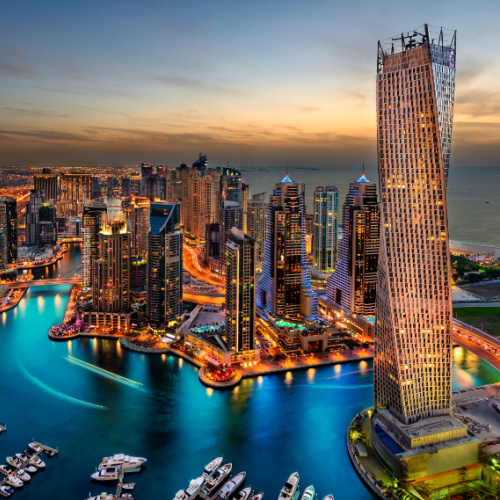
Ashraf Jandali/Shutterstock
When Is the Best Time to Visit Dubai?
The best time to visit Dubai is during the shoulder seasons of November to March. During these months, the weather is generally mild and sunny, with fewer crowds and lower prices than during the peak winter season.
Benefits of visiting Dubai during the shoulder seasons:
- Mild weather: Dubai has a hot desert climate, with summers that can be very hot and humid. However, the shoulder seasons offer mild weather, which is perfect for sightseeing and outdoor activities.
- Fewer crowds: Dubai is a popular tourist destination, but the shoulder seasons are less crowded than the peak winter season. This means you can enjoy the city’s attractions without having to deal with large crowds.
- Lower prices: Prices for flights, accommodation, and activities are generally lower during the shoulder seasons than during the peak winter season. This means you can save money on your trip without having to sacrifice quality.
Specific examples of how you can enjoy the most of Dubai during the shoulder seasons:
- November to January: Visit the Burj Khalifa, the Dubai Mall, the Dubai Miracle Garden, and the Dubai Marina. Take a desert safari or a boat trip on the Dubai Creek.
- February to March: Visit the Global Village, the Dubai Flower Centre, and the Dubai Frame. Enjoy the city’s many beaches and waterparks.
While it is possible to visit Dubai at any time of year, the shoulder seasons of spring and autumn offer the best combination of mild weather, fewer crowds, and a variety of activities and attractions to choose from.
 Average Temperatures by Month
Average Temperatures by Month
|
Jan |
Feb |
Mar |
Apr |
May |
Jun |
Jul |
Aug |
Sep |
Oct |
Nov |
Dec |
| Fahrenheit |
68°
|
69°
|
75°
|
82°
|
91°
|
97°
|
100°
|
100°
|
96°
|
88°
|
79°
|
71°
|
| Celsius |
20°
|
21°
|
24°
|
28°
|
33°
|
36°
|
38°
|
38°
|
36°
|
31°
|
26°
|
22°
|
Climate in Dubai
Summer Season in Dubai
Summers in Dubai are extremely hot and humid, with temperatures frequently exceeding 40°C (104°F) during the day. This season experiences almost no rainfall, and the high humidity levels can make the heat feel more intense. Summer is characterized by clear, sunny skies, and is less ideal for outdoor activities due to the extreme heat, though it's a good time to enjoy indoor attractions and activities.
Rainy Season in Dubai
Dubai does not have a defined rainy season like tropical regions. The city receives minimal rainfall year-round, with slight increases during the winter months (December to February). When rain does occur, it is usually in the form of short, scattered showers and is generally not heavy.
Winter Season in Dubai
Winters in Dubai are mild and pleasant, with temperatures ranging from 15°C to 25°C (59°F to 77°F). This season sees more rainfall than the rest of the year, but it remains minimal. Winter is the most comfortable and popular time for outdoor activities, sightseeing, and exploring the city's many attractions, as the weather is far more tolerable than in the hot summer months.
Our Recommendations
| Destination |
Jan |
Feb |
Mar |
Apr |
May |
Jun |
Jul |
Aug |
Sep |
Oct |
Nov |
Dec |
| Dubai |
 |
 |
 |
 |
 |
 |
 |
 |
 |
 |
 |
 |






